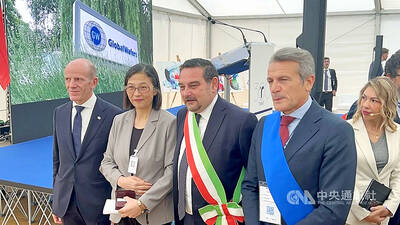The New Taiwan dollar fell the most in six weeks as Asian stocks retreated on renewed concern that the global recession would deepen, spurring investment outflow. Bonds were little changed.
The NT dollar snapped a two-day gain, extending a decline this quarter to 3 percent after US Treasury Secretary Timothy Geithner said some financial institutions would need substantial government aid, and factory production in Japan slumped for a fifth month.
The TAIEX dropped 3 percent, the most since Jan. 15, following last week’s 8.7 percent rally, the biggest since October 2002.
“We are seeing a bit of a correction in all stocks and currencies today [yesterday],” said David Cohen, director of Asian Economic Forecasting at Action Economics in Singapore.
The NT dollar fell 0.7 percent to NT$34.015 as of the close, the biggest drop since Feb. 17, Taipei Forex Inc said.
Overseas investors sold more equities than they bought yesterday for a second day.
The MSCI Asia-Pacific Index lost 3.7 percent, following a five-day, 7.5 percent jump that took valuations to the highest since December 2007.
The nation’s export orders extended the longest slump since 2001 last month as global demand for electronics goods tumbled.
“A number of Asian currencies like the [South] Korean won and Taiwan’s dollar had been benefiting from the global stocks rebound on optimism the economy will start to pick up before the year-end,” said Cohen. “But we’ll have to swallow a lot of grim data before that theory can be proven.”
Meanwhile, the government’s 10-year bonds were little changed.
An index of leading indicators, a gauge of economic conditions three months ahead, fell 0.5 percent last month from the previous month after a 3.2 percent decline in January, the Council for Economic Planning and Development said on Friday.
The nation slipped into a recession in the fourth quarter, when GDP shrank 8.36 percent.
“A lot of the bonds are held by banks,” said Chen Hung-hsiu, a debt trader at Grand Cathay Securities Corp (大華證券) in Taipei. “The outlook for the economy is murky, so banks don’t need to cut bond holdings.”
The yield on the 1.375 percent bond maturing in March 2019 declined 1 basis point to 1.53 percent as of the close in Taipei, said GRETAI Securities Market, the nation’s biggest exchange for bonds.
Its price climbed 0.065 or NT$65 per NT$100,000 (face amount) to 98.5511.

RECYCLE: Taiwan would aid manufacturers in refining rare earths from discarded appliances, which would fit the nation’s circular economy goals, minister Kung said Taiwan would work with the US and Japan on a proposed cooperation initiative in response to Beijing’s newly announced rare earth export curbs, Minister of Economic Affairs Kung Ming-hsin (龔明鑫) said yesterday. China last week announced new restrictions requiring companies to obtain export licenses if their products contain more than 0.1 percent of Chinese-origin rare earths by value. US Secretary of the Treasury Scott Bessent on Wednesday responded by saying that Beijing was “unreliable” in its rare earths exports, adding that the US would “neither be commanded, nor controlled” by China, several media outlets reported. Japanese Minister of Finance Katsunobu Kato yesterday also

‘DRAMATIC AND POSITIVE’: AI growth would be better than it previously forecast and would stay robust even if the Chinese market became inaccessible for customers, it said Taiwan Semiconductor Manufacturing Co (TSMC, 台積電) yesterday raised its full-year revenue growth outlook after posting record profit for last quarter, despite growing market concern about an artificial intelligence (AI) bubble. The company said it expects revenue to expand about 35 percent year-on-year, driven mainly by faster-than-expected demand for leading-edge chips for AI applications. The world’s biggest contract chipmaker in July projected that revenue this year would expand about 30 percent in US dollar terms. The company also slightly hiked its capital expenditure for this year to US$40 billion to US$42 billion, compared with US$38 billion to US$42 billion it set previously. “AI demand actually

Jensen Huang (黃仁勳), founder and CEO of US-based artificial intelligence chip designer Nvidia Corp and Taiwan Semiconductor Manufacturing Co (TSMC, 台積電) on Friday celebrated the first Nvidia Blackwell wafer produced on US soil. Huang visited TSMC’s advanced wafer fab in the US state of Arizona and joined the Taiwanese chipmaker’s executives to witness the efforts to “build the infrastructure that powers the world’s AI factories, right here in America,” Nvidia said in a statement. At the event, Huang joined Y.L. Wang (王英郎), vice president of operations at TSMC, in signing their names on the Blackwell wafer to

Taiwan-based GlobalWafers Co., the world’s third largest silicon wafer supplier, on Wednesday opened a 12-inch silicon wafer plant in Novara, northern Italy - the country’s most advanced silicon wafer facility to date. The new plant, coded “Fab300,” was launched by GlobalWafers’ Italian subsidiary MEMC Electronics Materials S.p.A at a ceremony attended by Taiwan’s representative to Italy Vincent Tsai (蔡允中), MEMC President Marco Sciamanna and Novara Mayor Alessandro Canelli. GlobalWafers Chairwoman Doris Hsu (徐秀蘭) said the investment marked a milestone in the company’s expansion in Europe, adding that the Novara plant will be powered entirely by renewable energy - a reflection of its